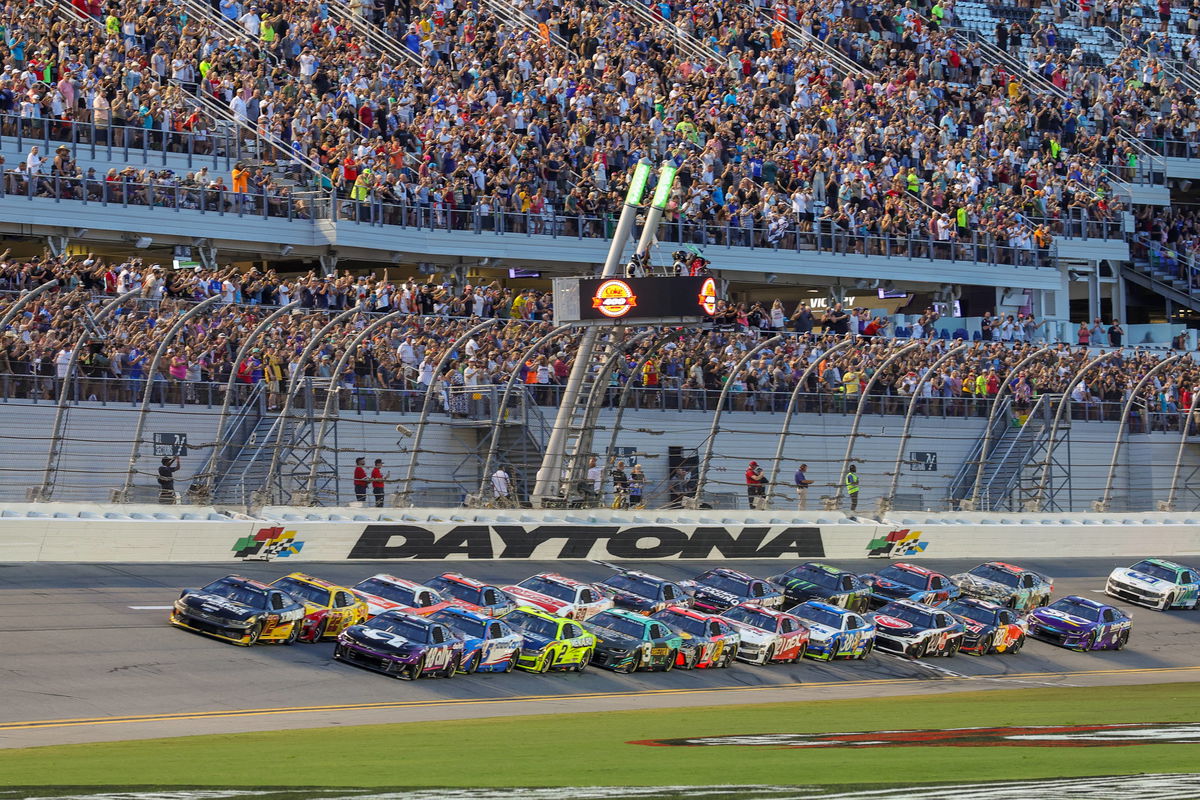Oct 3, 2025 | 12:37 PM EDT

Imago
NASCAR, Motorsport, USA Coke Zero Sugar 400 Aug 23, 2025 Daytona Beach, Florida, USA Drivers get the green flag to start the Coke Zero Sugar 400 at Daytona International Speedway. Daytona Beach Daytona International Speedway Florida USA, EDITORIAL USE ONLY PUBLICATIONxINxGERxSUIxAUTxONLY Copyright: xMikexWattersx 20250823_tbs_sk4_324

Imago
NASCAR, Motorsport, USA Coke Zero Sugar 400 Aug 23, 2025 Daytona Beach, Florida, USA Drivers get the green flag to start the Coke Zero Sugar 400 at Daytona International Speedway. Daytona Beach Daytona International Speedway Florida USA, EDITORIAL USE ONLY PUBLICATIONxINxGERxSUIxAUTxONLY Copyright: xMikexWattersx 20250823_tbs_sk4_324

Imago
NASCAR, Motorsport, USA Coke Zero Sugar 400 Aug 23, 2025 Daytona Beach, Florida, USA Drivers get the green flag to start the Coke Zero Sugar 400 at Daytona International Speedway. Daytona Beach Daytona International Speedway Florida USA, EDITORIAL USE ONLY PUBLICATIONxINxGERxSUIxAUTxONLY Copyright: xMikexWattersx 20250823_tbs_sk4_324

Imago
NASCAR, Motorsport, USA Coke Zero Sugar 400 Aug 23, 2025 Daytona Beach, Florida, USA Drivers get the green flag to start the Coke Zero Sugar 400 at Daytona International Speedway. Daytona Beach Daytona International Speedway Florida USA, EDITORIAL USE ONLY PUBLICATIONxINxGERxSUIxAUTxONLY Copyright: xMikexWattersx 20250823_tbs_sk4_324
The Daytona 500, often dubbed “The Great American Race,” has been the cornerstone of NASCAR since its inception in 1959. Held annually at Daytona International Speedway in Florida, the season opener holds the distinction of being the most prestigious race in the NASCAR Cup Series. Over the decades, iconic drivers have etched their names into history with memorable victories on this 2.5-mile superspeedway. But now, the NFL and other sports have started diminishing their glamor.
Watch What’s Trending Now!
The NFL has been extending its season to capitalize on its growing popularity. The 2025 season saw the league’s first-ever regular-season game in Ireland, between the Pittsburgh Steelers and the Minnesota Vikings, attracting 7.9 million viewers globally. As NASCAR ratings fall, the NFL continues to dominate them, with the 2025 Super Bowl LIX drawing a peak audience of 137.7 million viewers across television and streaming platforms. That domination could now threaten the Daytona 500’s traditional glory in the coming years.
The Daytona 500 faces an unexpected changing sports landscape
In a candid exchange with Fox reporter Bob Pockrass on his Happy Hour podcast, Kevin Harvick remarked, “Sounds like the Super Bowl, the NFL season is gonna get longer. Does the Daytona 500 have to be the first race of the season, or can we knock off some in January so that we can end earlier?” The sheer market saturation of professional football, which has expanded its regular season to 17 games with discussions for a potential 18-game schedule growing louder in recent years, is directly impacting NASCAR’s traditional start.
Pockrass responded, “It sounds like that NASCAR is pretty adamant that the Daytona 500 will be the first race of the year. I personally don’t think it has to be, but NASCAR has said that their fan polls that they’ve taken want the Daytona 500 to be the first points race of the year. I haven’t seen that survey, but if that’s what the fans are saying…” NASCAR’s commitment is rooted in the fact that the Daytona 500 has been the season-opening points race of the Cup Series since 1982, cementing its status as the most prestigious event on the schedule.
Harvick, however, expressed skepticism over the methods used to gauge fan preferences, suggesting that the reported poll results might not truly reflect the desires of a broad audience. “I’d have to find a new place to poll this. I don’t know who’s on this poll, but it seems a lot like the political polls that are never right. Maybe we need a broader scope of fans,” he said. For NASCAR, ensuring its decisions are guided by truly representative fan data is critical, especially when considering changes to such an iconic event.

Imago
NASCAR, Motorsport, USA Cup Series: February 16 Daytona 500 NASCAR Cup Series: February 16 Daytona 500 LicenseRM 23029959 Copyright: xZoonar.com/GrindstonexMediaxGroup/ASPInc./ColinxMayrx 23029959
Pockrass then noted this historical precedent as a counter-argument to the notion that the schedule is immutable: “If you want to go back old school and go 36 races, there’s a time when the Daytona 500 wasn’t the first race of the year.” Indeed, before the 1982 season, the Cup Series often started its season in January at Riverside International Raceway in California, meaning the Daytona 500 was sometimes the 2nd or 3rd event on the calendar.
Ultimately, the driving force behind the entire discussion is the ever-expanding footprint of the NFL, which has become a year-round entity with massive cultural and media dominance. Harvick summarized the core competitive challenge facing all winter and spring sports, emphasizing, “I just think that football has become so popular that it makes the dynamic very difficult to compete against them at this point in the year.”
The NFL’s colossal television ratings and widespread media coverage during January and February create a media vacuum that is nearly impossible for any other sport to penetrate effectively.
By moving the start of the NASCAR season to an earlier, less contested time slot in January, the series could theoretically establish its own narrative before the full force of the NFL playoffs. But before Harvick and Pockrass expressed their concern, another NASCAR veteran was ready with remedies to fix this problem.
Dale Earnhardt Jr. reflects on the Daytona 500’s legacy and how to restore its glory
Dale Earnhardt Jr., a two-time Daytona 500 winner in 2004 and 2014, reflected on the evolving prestige of NASCAR’s crown jewel. He emphasized that “The Daytona 500, for all of my life, has been compared to the Super Bowl of the NFL. It has always been this very important event that everyone did everything they could to try to find a way to win it once,” underscoring how victories here once defined careers, as seen with legends like Richard Petty and Jeff Gordon.
Yet with the current playoff format emphasizing overall championships, he noted that “no one’s asking those questions now because obviously everyone would say, ‘I want that championship because of the Daytona 500,’ and it’s solidified spot as the most important race is no longer the case.” He criticized the conservative tactics dominating superspeedway races, highlighting fuel-saving strategies that have dampened excitement.
“The racing there over the last several years has taken a beating from critics, myself included,” he said, pointing out the challenge in keeping Daytona and Talladega engaging. Drawing from the past, he suggested a practical change: introducing a fourth stage to increase point significance and encourage aggressive racing.
“And so adding this fourth stage and making those races mean more from a point standpoint would also make the races, again, mean more from a competitor standpoint,” he explained, noting that this could mirror the Coca-Cola 600 format at Charlotte, where multiple segments keep strategies dynamic.
While acknowledging that no solution is perfect, Junior stressed the potential for track tweaks to restore thrilling on-track battles. “I think that if you add the four stages, you more than likely, more often get that style of race,” he said. Officials like Mike Forde have confirmed discussions on this approach, suggesting it could minimize fuel-conservation tactics and keep front-runners from controlling lanes, ultimately bringing Daytona closer to its legendary status.



